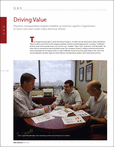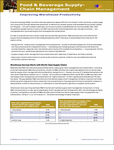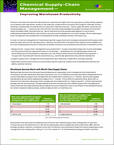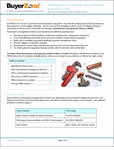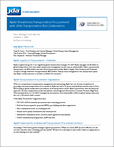Learn how PepsiCo's Transportation Experts Save Costs and Create a New Revenue Stream. | |
With annual revenues of nearly $60 billion, PepsiCo offers one of the world's largest portfolios of food and beverage brands. Yet even with its tremendous size and global scope, the company strives to create an environment where every employee has the opportunity to make a difference and bring truly great ideas to life. Mark Whittaker, PepsiCo's vice president of transportation, and his team saw an opportunity to add value and generate revenue by establishing an internal logistics services division for the various PepsiCo business units. Profitable from the start, Pepsi Logistics Company, Inc. (PLCI) is now moving 40,000 shipments annually. Read this interview to hear Whittaker—joined by Rob Hair, director of PepsiCo transportation systems and processes, and Andy Greenberg, manager of PLCI—discuss their management approach, growth strategies and the rewards of treating each and every shipment as an opportunity to gain and retain business. GET IT NOW ! | |
Jumat, 25 Februari 2011
Driving Value
Label:
Logistics,
Transportation
Charting a New Course in Effective Distribution Supply Chain Management
Learn how Supply Chain Management can help your organization regain control of their operations and match their investment with their demand levels to ensure profitability. | |
Supply Chain Management (SCM) is back with a vengeance for distributors operating today. And, while the primary reasons for pursuing supply chain effectiveness continue to be lowered operating costs, improved customer service and increased profitability, the complexities and challenges within today's marketplace have dramatically altered the strategies needed to achieve it. Today's supply chains require completely different approaches to address these changing market conditions; and distributors who fail to recognize this may not survive into the next decade. GET IT NOW ! | |
Label:
Logistics,
Transportation
Food & Beverage Supply Chain Management - Improving Warehouse Productivity
World-class supply chain management is the backbone of safe, profitable food and beverage manufacturing. | |
Food and Beverage (F&B) manufacturers face operations issues different from those in other industries, at every stage from production through warehouse operations. In distribution centers, goods must be expeditiously picked, packed and shipped, not just to satisfy customers, but to ensure quality of perishables and minimize safety risks. In order to improve this core function today and into the next generation, F&B manufacturers must rethink their strategies and do three things exceptionally well:
GET IT NOW ! | |
Label:
Logistics,
Transportation
Chemical Supply Chain Management - Improving Warehouse Productivity
World-class supply chain management is the backbone of safe, profitable chemical manufacturing. | |
Chemical manufacturers face strict demands from customers and tight control by regulators, putting intense pressure on all facets of their operations. Chemical products require purity, and chemical manufacturing processes are subject to complex environment, health and safety requirements. Inefficiencies erode profitability, and errors put not just the customer satisfaction but lives in danger. World-class supply chain management and collaboration is the backbone of safe, profitable chemical manufacturing. In order to improve management of materials across their supply chains and increase collaboration, chemical manufacturers must rethink their strategies and do three things exceptionally well:
GET IT NOW ! | |
Label:
Logistics,
Transportation
Maintenance Management Software Buyer's Guide
Your business' maintenance management software is a critical purchasing decision. BuyerZone will walk you through everything you need to know before you buy, along with Free price quotes (via phone and email) from multiple vendors. | |
Receive this FREE "Maintenance Management Software" Buyer's Guide along with complimentary, no obligation price quotes (via phone and email) from multiple quality & independent Maintenance Management Software providers. As difficult as it can be to purchase business facilities, equipment, and vehicles, keeping track of the maintenance they require is an even bigger challenge – and it's one you'll be grappling with for years. This Maintenance Management Software Buyer's Guide will help you decide what to look for in an MMS system, how to compare multiple options, what you can expect to pay, and how to choose the right vendor. GET IT NOW ! | |
Label:
Logistics,
Transportation
Rabu, 23 Februari 2011
Lower Transportation Costs Through Bid Collaboration
Learn how a transportation bid collaboration system can transform labor-intensive and time-consuming procurement and contracting processes to be more efficient. | |
As a Transportation & Logistics professional, you know that network design, route and capacity analysis can provide substantial savings. So, too, can logistics sourcing. By leveraging a transportation bid collaboration system, shippers can improve contract negotiations, and allocate transportation contracts to the most efficient and cost-effective carriers. GET IT NOW ! | |
Label:
Logistics,
Transportation
Global Logistics Management
Global Logistics management as a result of global sourcing, transportation management is becoming a more strategic business function at companies where it has not traditionally been a core competency. | |
Some key best practices for managing global logistics include:
| |
Label:
Logistics,
Transportation
Langganan:
Postingan (Atom)
